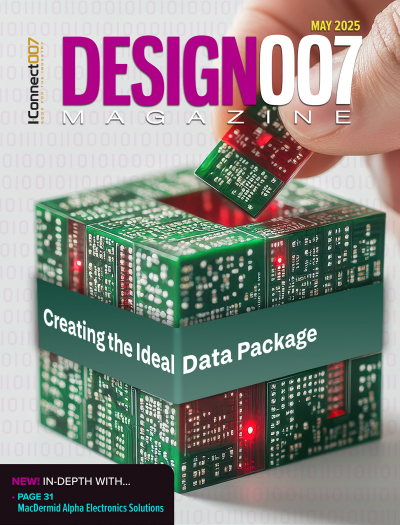-

- News
- Books
Featured Books
- design007 Magazine
Latest Issues
Current Issue
Showing Some Constraint
A strong design constraint strategy carefully balances a wide range of electrical and manufacturing trade-offs. This month, we explore the key requirements, common challenges, and best practices behind building an effective constraint strategy.

All About That Route
Most designers favor manual routing, but today's interactive autorouters may be changing designers' minds by allowing users more direct control. In this issue, our expert contributors discuss a variety of manual and autorouting strategies.

Creating the Ideal Data Package
Why is it so difficult to create the ideal data package? Many of these simple errors can be alleviated by paying attention to detail—and knowing what issues to look out for. So, this month, our experts weigh in on the best practices for creating the ideal design data package for your design.
- Articles
- Columns
- Links
- Media kit
||| MENU - design007 Magazine
Intel Unveils Next-Generation AI Solutions with the Launch of Xeon 6 and Gaudi 3
September 25, 2024 | IntelEstimated reading time: 3 minutes
As AI continues to revolutionize industries, enterprises are increasingly in need of infrastructure that is both cost-effective and available for rapid development and deployment. To meet this demand head-on, Intel today launched Xeon 6 with Performance-cores (P-cores) and Gaudi 3 AI accelerators, bolstering the company’s commitment to deliver powerful AI systems with optimal performance per watt and lower total cost of ownership (TCO).
“Demand for AI is leading to a massive transformation in the data center, and the industry is asking for choice in hardware, software and developer tools,” said Justin Hotard, Intel executive vice president and general manager of the Data Center and Artificial Intelligence Group. “With our launch of Xeon 6 with P-cores and Gaudi 3 AI accelerators, Intel is enabling an open ecosystem that allows our customers to implement all of their workloads with greater performance, efficiency and security.”
More: Intel Xeon 6 with P-cores and Gaudi 3 AI Accelerators (Press Kit) | Leadership performance with Intel Xeon 6900 P-core series (Fact Sheet) | A New Era of High-Performance Enterprise AI Systems and Solutions (Quote Sheet)
Introducing Intel Xeon 6 with P-cores and Gaudi 3 AI accelerators
Intel’s latest advancements in AI infrastructure include two major updates to its data center portfolio:
Intel® Xeon® 6 with P-cores: Designed to handle compute-intensive workloads with exceptional efficiency, Xeon 6 delivers twice the performance of its predecessor2. It features increased core count, double the memory bandwidth and AI acceleration capabilities embedded in every core. This processor is engineered to meet the performance demands of AI from edge to data center and cloud environments.
Intel® Gaudi® 3 AI Accelerator: Specifically optimized for large-scale generative AI, Gaudi 3 boasts 64 Tensor processor cores (TPCs) and eight matrix multiplication engines (MMEs) to accelerate deep neural network computations. It includes 128 gigabytes (GB) of HBM2e memory for training and inference, and 24 200 Gigabit (Gb) Ethernet ports for scalable networking. Gaudi 3 also offers seamless compatibility with the PyTorch framework and advanced Hugging Face transformer and diffuser models. Intel recently announced a collaboration with IBM to deploy Intel Gaudi 3 AI accelerators as a service on IBM Cloud. Through this collaboration, Intel and IBM aim to lower the total cost of ownership to leverage and scale AI, while enhancing performance.
Enhancing AI Systems with TCO Benefits
Deploying AI at scale involves considerations such as flexible deployment options, competitive price-performance ratios and accessible AI technologies. Intel’s robust x86 infrastructure and extensive open ecosystem position it to support enterprises in building high-value AI systems with an optimal TCO and performance per watt. Notably, 73% of GPU-accelerated servers use Intel Xeon as the host CPU3.
Intel partners with leading OEMs including Dell Technologies and Supermicro to develop co-engineered systems tailored to specific customer needs for effective AI deployments. Dell Technologies is currently co-engineering RAG-based solutions leveraging Gaudi 3 and Xeon 6.
Bridging the Gap from Prototypes to Production with Co-Engineering Efforts
Transitioning generative AI (Gen AI) solutions from prototypes to production-ready systems presents challenges in real-time monitoring, error handling, logging, security and scalability. Intel addresses these challenges through co-engineering efforts with OEMs and partners to deliver production-ready retrieval-augmented generation (RAG) solutions.
These solutions, built on the Open Platform Enterprise AI (OPEA) platform, integrate OPEA-based microservices into a scalable RAG system, optimized for Xeon and Gaudi AI systems, designed to allow customers to easily integrate applications from Kubernetes, Red Hat OpenShift AI and Red Hat Enterprise Linux AI.
Expanding Access to Enterprise AI Applications
Intel’s Tiber portfolio offers business solutions to tackle challenges such as access, cost, complexity, security, efficiency and scalability across AI, cloud and edge environments. The Intel® Tiber™ Developer Cloud now provides preview systems of Intel Xeon 6 for tech evaluation and testing. Additionally, select customers will gain early access to Intel Gaudi 3 for validating AI model deployments, with Gaudi 3 clusters to begin rolling out next quarter for large-scale production deployments.
New service offerings include SeekrFlow, an end-to-end AI platform from Seekr for developing trusted AI applications. The latest updates feature Intel Gaudi software’s newest release and Jupyter notebooks loaded with PyTorch 2.4 and Intel oneAPI and AI tools 2024.2, which include new AI acceleration capabilities and support for Xeon 6 processors.
Testimonial
"Our marketing partnership with I-Connect007 is already delivering. Just a day after our press release went live, we received a direct inquiry about our updated products!"
Rachael Temple - AlltematedSuggested Items
Intel Reports Q2 2025 Financial Results
07/25/2025 | IntelIntel continues to make progress to simplify its business, improve efficiency and enhance execution. These efforts are focused on reducing expenses, strengthening the balance sheet, optimizing the global footprint and concentrating resources on the most critical growth areas.
Alphabet Boosted by AI, Cloud Demand as Spending Needs Jump
07/24/2025 | I-Connect007 Editorial TeamGoogle’s parent company, Alphabet Inc., said that demand for artificial intelligence products boosted its quarterly sales, and now requires an extreme increase in capital spending to keep up in the AI race, Bloomberg reported. For 2025, the company stated its capital expenditure will be $85 billion—$10 billion more than previously forecast.
Benchmark Completes Key Role in U.S. Manufacturing and Testing for Intel’s Aurora Exascale Supercomputer
07/24/2025 | BUSINESS WIREBenchmark Electronics, Inc., a global provider of engineering, design, and manufacturing services, announced the successful commissioning and validation of the Aurora exascale supercomputer at Argonne National Laboratory
Eaton Signs Agreement to Acquire Resilient Power Systems
07/16/2025 | BUSINESS WIREIntelligent power management company Eaton announced it has signed an agreement to acquire Resilient Power Systems Inc., a leading North American developer and manufacturer of innovative energy solutions, including solid-state transformer-based technology.
Intel Brings Offline AI, Opportunity to Students in Guatemala
07/14/2025 | IntelAn initiative using Intel Core Ultra-powered AI PCs bridges the digital divide through on-device AI accelerators, bringing advanced technology to remote locations.


